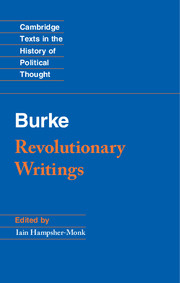 Revolutionary Writings
Revolutionary Writings Published online by Cambridge University Press: 05 June 2014
Burke’s Reflections has long been seen as an epitomic text, supposedly articulating an – indeed the first – theoretical defence of ‘modern conservatism’. In keeping with the philosophy of the Series, this edition seeks to place it in the intellectual contexts in which its author conceived and wrote it, whilst also indicating those in which it came to be read. Alongside Reflections – Burke’s early response to the Revolution – is included one of his last, the first Letter on a Regicide Peace, a work that reveals the development of his thought during the course of the Revolution and one that has helped to shape a particular view of international society.
The Introduction sketches a widening circle of contexts in which the works can be situated: beginning with the localised political circumstances faced by Burke at the time, and extending to the trans-historical and universal circumstances of human political agency to which Burke appeals in the course of his writing, and which have given his work a significance that has extended far beyond the specific conditions of the Revolution that gave rise to it – themselves of huge and still debated historical significance.
Neither Burke’s prose style nor his references are easily accessible to modern readers. Accordingly both works have been generously annotated to assist in understanding the significance of his wide and nowadays often obscure allusions, whilst leaving readers as free as possible to interpret the text for themselves. Burke was prodigiously well-read in both classical and modern literatures. He possessed extraordinary recall and wove quotations into his speech and writing with great, and doubtless sometimes subconscious, facility. Identifying all of these would have completely changed the character of the edition, but it seemed important to give enough to provide some sense of how richly Burke’s thinking is saturated in and conditioned by this literary and cultural heritage: a feature of the human mind which played such a central part in his political thinking.
To save this book to your Kindle, first ensure [email protected] is added to your Approved Personal Document E-mail List under your Personal Document Settings on the Manage Your Content and Devices page of your Amazon account. Then enter the ‘name’ part of your Kindle email address below. Find out more about saving to your Kindle.
Note you can select to save to either the @free.kindle.com or @kindle.com variations. ‘@free.kindle.com’ emails are free but can only be saved to your device when it is connected to wi-fi. ‘@kindle.com’ emails can be delivered even when you are not connected to wi-fi, but note that service fees apply.
Find out more about the Kindle Personal Document Service.
To save content items to your account, please confirm that you agree to abide by our usage policies. If this is the first time you use this feature, you will be asked to authorise Cambridge Core to connect with your account. Find out more about saving content to Dropbox.
To save content items to your account, please confirm that you agree to abide by our usage policies. If this is the first time you use this feature, you will be asked to authorise Cambridge Core to connect with your account. Find out more about saving content to Google Drive.